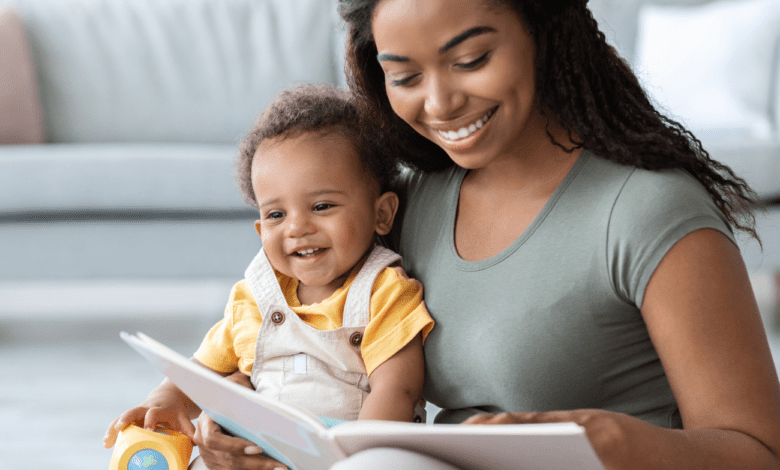Baby Speech Development Timeline and Milestones from Birth to One Year

There is no shortage of milestones in your baby’s first year of life, including speech development. Here’s a general timeline and what to know.
You just gave birth! Congratulations. Now, your pediatrician is asking if they are making sounds and gestures. is there already?! Help!
In the first 12 months of the baby, there are several significant milestones they will usually meet – many in related speech and language. I am here to explain them, when to expect them, and how to approach your pediatrician with any questions or concerns. I’ll also include some quick tips on how to promote progress.
An important note on milestones
there is some exceptions to milestone charts, and not all little ones will follow these steps. All children are unique.
If you have concerns about your child’s language development, please contact your pediatrician and a local speech-language pathologist.
Often, pediatricians will recommend “wait and see.” However, if your child does not reach these milestones and you have questions, a professional can help.
Early intervention is critical and a great resource already provides tools to parents and strategies needed to develop language in their infants from birth to childhood.
Timeline of your baby’s speech development
Birth to three months
In the first three months of life, the baby learns about you. They hear your voice and all the new, different, and exciting sounds around them. They are curious!
According to Children’s Hospital of Philadelphiababies will begin to recognize their mother’s voice, react to loud noises, wake up to loud sounds, and express their feelings of joy or disappointment by making noises like coos or cries.
Four to six months
Between 4 and 6 months of age, babies start respond to your attempts to chat with own vocalizations, notice changes in intonation, begin with imitate short speech soundsand begin to experience the absolute magic that’s a toy that makes noise. Get those rattles out!
Seven to eleven months
Between 7 and 11 months, things speed up in the field of speech and language development.
CHOP says babies can respond to their name, recognize common words, babble (for example, “ma ma,” “da da,” “ba ba”), try to communicate their needs using gestures, respond to requests (such as not, or coming), and can be start using simple baby words or signs.
One year old
Around 12 months of age, the baby can understand simple, one-step instructions, recognize and understand frequently used phrases, and try to imitate simple words.
At this time, your little one is the most likely to enjoy reading and have a favorite book or two – or three or four.

Professional tips for developing your baby’s speech
Some tips for language development from a pediatric speech-language pathologist, early interventionist, and mother.
1. Read as much as possible
Read! Read as much as possible with your baby, and start at birth. It usually feels weird when they are just newborns, but at this point, they learn your voice (and entertained by it), you are habit forming, and you are bonding. This is the best!
2. Face your baby
You hit the floor with your baby! Chat with them about anything and everything, and make sure they see your face. They will learn about articulation by observing your mouth and watching your every expression. Soon, they will also imitate!
3. Narrate everything
Cooking breakfast? “We’re going to eat pancakes today. Here is a bowl; let’s stir, stir, stir!”
Take a bath? “Let’s take a bath. We turned on the water. Let’s use soap! Scrub, scrub, scrub.”
This simple, everyday narrative exposing your child to so many languages they can use in their daily work.
Other articles that may help you
Hello Postpartum participates in the Amazon Services LLC Associates Programan affiliate advertising program designed to provide a way for sites to earn advertising fees by advertising and linking to Amazon.com.






